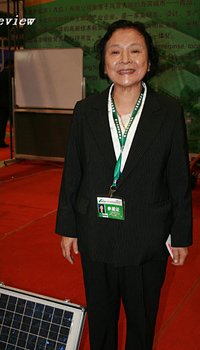
"We brought the first sample of a solar flat thermal collector from Australia in 2002," said Dr. Rosie Wang. "And we managed to set up the first two solar lighting systems alongside the jetty in Qingdao, in cooperation with Suntech of Wuxi, now the largest solar module provider in the world." Dr. Wang, Managing Director of Qingdao New Energy Center (QDNE), was outlining the history of her company to Beijing Review.
QDNE is a renewable energy enterprise located in Qingdao, a coastal city in east China's Shandong Province. It was solely invested in and registered by Australia Battery Technology & Trading Pty. Limited in 2005, and now has some 90 employees, with an average yearly turnover of around 20 million yuan (about $2.63 million).
Wang added that QDNE aimed to introduce to China the advanced solar energy technology from Australia as well as promising products in solar thermal and solar photovoltaic fields, all of which could help address the country's chronic energy-consuming problems.
"We have just started to introduce two products in China," she stated. "One is the solar thermal project application, comprising hot water supply, heating and air conditioning projects, etc., in hotels and residential complexes. Another is the solar photovoltaic power application, which consists of, for instance, panels for the integration of building constructions and solar generating electricity for households."
According to Wang, within QDNE, a research and development (R&D) center, which will cover at least 200 mus (about 13.3 hectares), is currently under construction and scheduled to be completed within six months. But the first and foremost thing Wang and her employees are worried about is funds.
How to tap into different sources to start up and expand is usually cause for concern to Small- and Medium-sized Enterprises (SMEs), at home and abroad. Not surprisingly, panelists attending the forums during the ASEM Trade and Investment Fair on SMEs held in Qingdao on October 29-November 1, focused on the status quo and common problems that shared by SMEs. There was also another two-day gathering as the ASEM SME Ministerial Meeting opened in Beijing on October 30.
Money matters
Lack of access to funds is a shared and vital disadvantage among SMEs.
"We are now badly looking for Chinese partners to invest and help us set up the R&D center as soon as possible," said Wang. "That's why we are here attending the Fair."
At a panel of the Fair's theme forum -- the ASEM Business Leader Forum and Growing Enterprises Development Summit -- T.C. Kwan, executive vice president of the Bank of East Asia (China) Limited, listed seven key factors that he considered most important during a bank's loan evaluating process for a SME: management officers' experience and credibility, financial condition, marketing strategy and management model, prospects in the industry, ability to repay, track records of the company and its owner, and mortgage.
"Whether loans can be granted to SMEs depends on the above-mentioned factors," he said. "But there are some problems that most SMEs needed to address. For instance, their systems seem laggard and need improving, their financial information seems far from transparent, etc. No wonder the revenue-oriented bank prefers to choose big-name enterprises."
At another panel of the Fair's forum, the ASEM SMEs Investment Forum, Zhang Aimin, Senior Director of Prax Capital, listed significant factors in the way SMEs collected funds: timing, the way of collecting funds, evaluation, added values, and track records.
"The timing refers to the stage and scale that a company reaches," he said. "The SMEs can collect funds via relatives, friends, angel investors, venture capital and even IPOs (initial public offerings). Personally, strategic investors are far less than financial investors here in China. But the good news is that the number of SMEs that are worth investing in is increasing; huge amounts of funds from abroad flow in, given China's booming economy."
Product innovation
"Innovation plays a crucial role in the development of the company, since competition is fierce," Wang told Beijing Review.
The portable solar powered box is one of QDNE's patented products on display at the Fair. The 18 kg box is at 300 w unitized with mono-crystal line, silicon solar module, accumulator, controller, cabinet, 10 w energy-saving bulb and charges. It can be used as a household appliance, for long-distance traveling, in areas with no electricity, etc.
